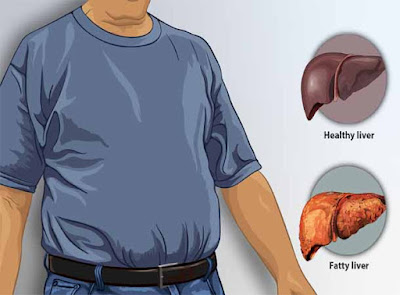What to Know About Fatty Liver Disease & How to Deal with it?
Symptoms of Fatty Liver
Firstly we will talk about Symptoms of Fatty Liver Disease. Fatty liver which is also known as hepatic steatosis, is a condition where there is an accumulation of fat in liver cells. In the early stages, there may be no symptoms, but as the condition progresses, some common symptoms that may occur include:
1. Fatigue
2. Weakness
3. Weight loss or weight gain
4. Loss of appetite
5. Nausea and vomiting
6. Abdominal pain and discomfort
7. Enlarged liver
8. Jaundice (yellowing of the skin and eyes)
9. Swelling in the legs and ankles
10. Spider-like blood vessels on the skin
However, it's important to note that some people with fatty liver may not experience any symptoms at all, and the condition may be discovered during routine blood tests or imaging studies. If you suspect you may have fatty liver, it's important to talk to your healthcare provider to get a proper diagnosis and treatment plan.
World Hypertension Day: हाइपरटेंशन जैसी घातक बीमारी से बचना है तो जरूर अपनाएं ये तरीके
Diet for Fatty Liver Disease?
Making dietary changes is one of the most important steps you can take to manage fatty liver. Here are some general dietary guidelines that can help improve the condition:
Reduce your intake of saturated and trans fats: These unhealthy fats can increase your risk of developing fatty liver. Avoid foods that are high in saturated and trans fats, such as fried foods, processed snacks, and fatty meats.
Increase your intake of fruits and vegetables: These foods are high in antioxidants and other nutrients that can help protect your liver and reduce inflammation. Aim for 5 servings of fruits and vegetables per day at least.
Choose lean protein sources: Good sources of lean protein include fish, chicken, turkey, tofu, and legumes.
Limit your intake of refined carbohydrates: These foods can cause spikes in your blood sugar levels, which can lead to inflammation and liver damage. Avoid sugary drinks, candy, white bread, and other refined carbohydrates.
Avoid alcohol: Drinking alcohol can cause inflammation and damage to the liver. If you have fatty liver, it's important to avoid alcohol completely.
Stay hydrated: Drinking plenty of water can help flush toxins out of your body and keep your liver functioning properly.
Eat smaller, more frequent meals: Eating smaller meals throughout the day can help keep your blood sugar levels stable and reduce the strain on your liver.
It's important to work with a healthcare provider or registered dietitian to develop a personalized diet plan that meets your specific needs and goals.
World Laughter Day पर जानिए हंसने के 5 बड़े फायदे, अच्छी सेहत पाने के लिए जरूर पढ़ें
General Treatment for Fatty Liver Disease
Treatment for fatty liver depends on the underlying cause and severity of the disease. Here are some general treatment options:
1. Lifestyle Changes: Making healthy lifestyle changes is one of the most effective ways to manage fatty liver disease. These changes include:
Losing weight: Achieving and maintaining a healthy weight can help reduce fat accumulation in the liver.
Eating a healthy diet: A diet rich in fruits, vegetables, whole grains, and lean protein sources, and low in saturated and trans fats can help reduce fat accumulation in the liver.
Exercise: Regular physical activity can help improve insulin sensitivity and reduce fat accumulation in the liver.
Limiting alcohol intake: Drinking alcohol in excess can damage the liver and worsen fatty liver disease.
2. Medications: Some medications may be prescribed to help manage fatty liver disease. These include:
Insulin-sensitizing agents: Medications that improve insulin sensitivity, such as pioglitazone, may be used to treat fatty liver disease in people with type 2 diabetes.
Lipid-lowering medications: Medications that lower cholesterol levels, such as statins, may be prescribed to people with fatty liver disease who have high cholesterol levels.
Vitamin E: This antioxidant has been shown to have a beneficial effect on fatty liver disease in some studies.
3. Management of underlying conditions: If fatty liver disease is caused by an underlying condition such as hepatitis C, obesity, or diabetes, treating the underlying condition may help improve the fatty liver.
It's important to note that treatment for fatty liver disease should be individualized and monitored by a healthcare provider.
It is advice that please consult your doctor before take any necessary medicine.









![How To Remove “Showing Posts With Label” In New Blogger Templates 2020 - [New Code Added]](https://blogger.googleusercontent.com/img/b/R29vZ2xl/AVvXsEjG32hRmCxkbKD8om9544cwJX8a4vNDhG2Ts21Vq6ripaI8mTNkH8hfsMtWE7q8w1U2L2CDqFR9niY6iqXJ-REyZK7r6NXbjit_hTCnkcZjlyaKli7z79LROdHI1EtsiWiBYblJgeDdGp8/w100/how+to+remove+showing+post+with+label+in+new+blogger+templates+2020.JPG)

![Aadhaar Operator & Supervisor Exam Questions and Answers Key 2023 [Updated] - 100% Pass Guarantee](https://blogger.googleusercontent.com/img/b/R29vZ2xl/AVvXsEj4kBoWQdQ6Da4A_Aqsshay8baNSVhp9KhJ_gVYCxQbyBFcFnJi3Daa7zJ1KOs7g6-WkZNyUQPF0Q3cdBAAeVW9QkVTxITgkIX86qXcCZRJ65XaHxSR4_blMT2vmHAwDe8JBNeEl951dnjBlmvrGnCbK4fBBL0DD--ldbTemP_43xmydfkuELw9Nv3r/w100/Aadhaar%20Supervisor%20Exam%20Questions%20and%20Answers%20Key%202023.JPG)

![CSC TEC Exam Question Answer Key 2023 [Updated] – 100% Pass Guarantee](https://blogger.googleusercontent.com/img/b/R29vZ2xl/AVvXsEhUgrbJLVCNtdxwdFPNCFweyJctg5VpAsZ8vFifyOTBlcSqsN-ikv5iPgbezrDPWz75etYIBI0_ThxgWPqSz_jbY3Noo22i2hY82LMDMfhEtlj0QmsSBmWrSR7CWH5kUpA37VCj_qo6RvBchoqhYhuCTq0_R9ZqhR8f-25Jc1NBlokign3NAbxzSPLY/w100/csc%20tec%20exam%20question%20answer%20key%202022%20updated.JPG)


0 टिप्पणियाँ